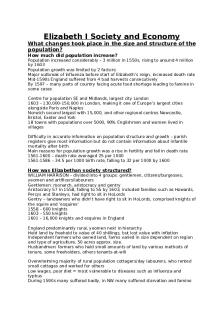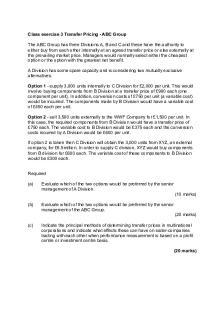Analysis of Queen Elizabeth I class exercise PDF

| Title | Analysis of Queen Elizabeth I class exercise |
|---|---|
| Course | Structure of English |
| Institution | Copenhagen Business School |
| Pages | 2 |
| File Size | 122.2 KB |
| File Type | |
| Total Downloads | 75 |
| Total Views | 168 |
Summary
Business case use for information and inspirationBusiness case use for information and inspirationBusiness case use for information and inspirationBusiness case use for information and inspirationBusiness case use for information and inspiration...
Description
Analysis of Queen Elizabeth I’s speech to the troops at Tilbury
”My loving people, We have been persuaded by some that are careful of our safety, to take heed how we commit ourselves to armed multitudes, for fear of treachery; but I assure you I do not desire to live to distrust my faithful and loving people. Let tyrants fear. I have always so behaved myself that, under God, I have placed my chiefest strength and safeguard in the loyal hearts and good-will of my subjects; and therefore I am come amongst you, as you see, at this time, not for my recreation and disport, but being resolved, in the midst and heat of the battle, to live and die amongst you all; to lay down for my God, and for my kingdom, and my people, my honour and my blood, even in the dust. I know I have the body but of a weak and feeble woman; but I have the heart and stomach of a king, and of a king of England too, and think foul scorn that Parma or Spain, or any prince of Europe, should dare to invade the borders of my realm: to which rather than any dishonour shall grow by me, I myself will take up arms, I myself will be your general, judge, and rewarder of every one of your virtues in the field. I know already, for your forwardness you have deserved rewards and crowns; and We do assure you in the word of a prince, they shall be duly paid you. In the mean time, my lieutenant general shall be in my stead, than whom never prince commanded a more noble or worthy subject; not doubting but by your obedience to my general, by your concord in the camp, and your valour in the field, we shall shortly have a famous victory over those enemies of my God, of my kingdom, and of my people.”
1. Write down notes to the five features of the rhetorical pentagram. I have added some specific questions to language. Please answer these. You can also use the questions that were listed underneath each feature in the text you read at home.
Speaker: (The person giving the speech) Circumstances: (The circumstances of the speech) Subject: (What is the subject of the speech?)
Audience: (Who is the intended audience?) Language: (Which language is used?)
Rhetorical devices: Queen Elizabeth I uses several rhetorical devices in her speech. The most prominent being modal verbs, antithesis, and tricolon. Read about these rhetorical devices here, find them in the speech and make a list. Forms of appeal: Which forms of appeal are used in the speech? Look at each paragraph separately and discuss her use of words and rhetorical devices to appeal to her audience. Highlight important words or phrases according to which form of appeal they enforce: pathos, ethos, logos.
2. The five features of the rhetorical pentagram together point towards the intention or purpose of the speech. What would you say is the intention/purpose of this speech? 3. Which of Aristotles’ three categories would you place this speech in? Why? 4. Naturally, there’s no recording of Queen Elizabeth I’s speech, so we can only analyse the non-verbal content. However, if you were to imagine an effective delivery of this speech, how do you imagine it? Comment on the main elements listed in the homework for today in relation to the ideal delivery of this speech (in some cases it may be hard to take the historical context into account, but fear not, this is not a history lesson): Facial expressions Gestures Body language and posture Paralinguistics Appearance Set-up/setting Proximity Eye contact Touch...
Similar Free PDFs

Elizabeth I Society and Economy
- 5 Pages

Class Exercise 2A
- 2 Pages

In Class Exercise 1
- 3 Pages

Literary analysis of \'I spy\'
- 2 Pages

EOCR- Exercise 38 - for class
- 6 Pages

Exercise 4 - User defined Class
- 6 Pages
Popular Institutions
- Tinajero National High School - Annex
- Politeknik Caltex Riau
- Yokohama City University
- SGT University
- University of Al-Qadisiyah
- Divine Word College of Vigan
- Techniek College Rotterdam
- Universidade de Santiago
- Universiti Teknologi MARA Cawangan Johor Kampus Pasir Gudang
- Poltekkes Kemenkes Yogyakarta
- Baguio City National High School
- Colegio san marcos
- preparatoria uno
- Centro de Bachillerato Tecnológico Industrial y de Servicios No. 107
- Dalian Maritime University
- Quang Trung Secondary School
- Colegio Tecnológico en Informática
- Corporación Regional de Educación Superior
- Grupo CEDVA
- Dar Al Uloom University
- Centro de Estudios Preuniversitarios de la Universidad Nacional de Ingeniería
- 上智大学
- Aakash International School, Nuna Majara
- San Felipe Neri Catholic School
- Kang Chiao International School - New Taipei City
- Misamis Occidental National High School
- Institución Educativa Escuela Normal Juan Ladrilleros
- Kolehiyo ng Pantukan
- Batanes State College
- Instituto Continental
- Sekolah Menengah Kejuruan Kesehatan Kaltara (Tarakan)
- Colegio de La Inmaculada Concepcion - Cebu









